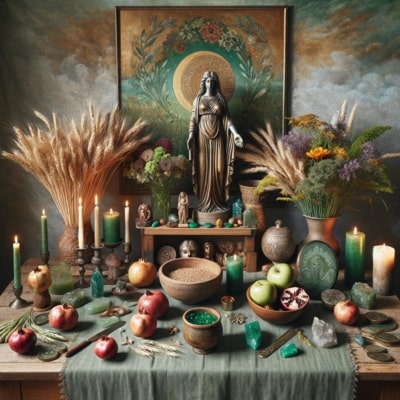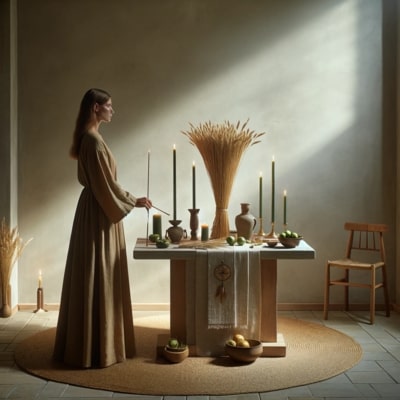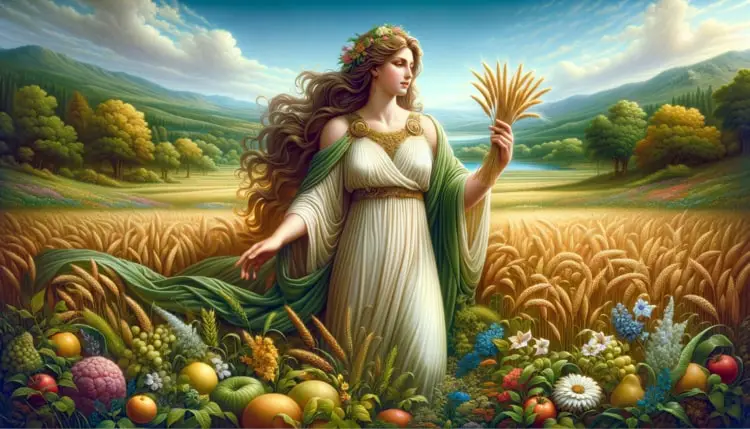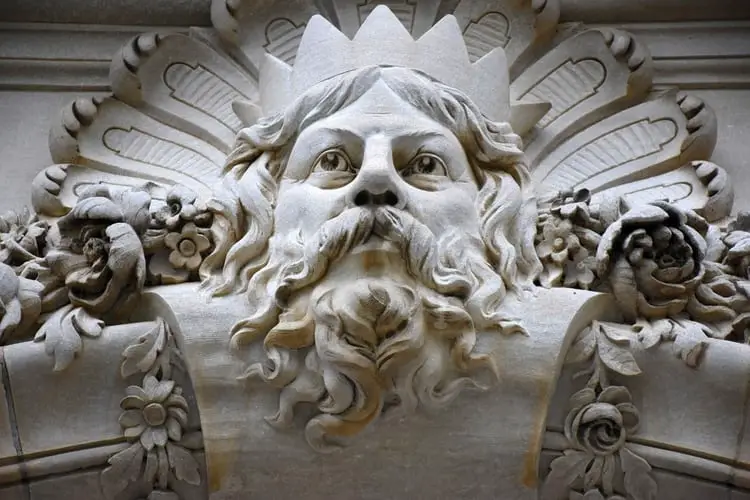How to Worship Demeter: Prayers, Invocation, Altar, Offerings..
Worshiping Demeter, the ancient Greek goddess of agriculture, involves a deeply personal connection with the cycles of nature. To honor her, one might begin by creating a dedicated space, such as an altar, in a quiet part of the home or garden. This space can be adorned with symbols representative of Demeter, like sheaves of wheat, barley, fruits, flowers, and perhaps a statue or image of the goddess herself, creating a focal point for reverence and meditation.
In expressing devotion, offerings hold significant value. Traditional gifts for Demeter include grains, bread, fruits (notably pomegranates), and even personal garden produce, reflecting the giver’s connection with the earth. These offerings, left on the altar, symbolize gratitude and respect for the life-giving aspects of nature that Demeter embodies.
Engaging in practices that align with Demeter’s domain can also be a form of worship. This might include gardening, focusing on sustainable agriculture, or participating in seasonal celebrations that acknowledge the cycles of growth, harvest, and renewal. The changing of the seasons, particularly the transition from summer to autumn, was a time when ancient Greeks celebrated Demeter’s gifts, and modern practitioners can also observe these times with rituals or festivals.
Incorporating prayer or meditation into daily practice can strengthen one’s connection to Demeter. These can be moments of quiet reflection on the gifts of the earth, expressing gratitude, and seeking guidance in living a life in harmony with nature.
Ultimately, worshiping Demeter is about cultivating a relationship with the natural world, recognizing the cycles of life and death, and honoring the nourishment and sustenance provided by the earth.
The Benefits of Working With Demeter
As a theurgist who engages with various deities, including Demeter, I can attest that the experience and gains from worshipping her are profound and unique. Demeter, as a potent deity of agriculture, fertility, and the cycles of life and death, offers specific and powerful blessings to her devotees.
First of all, when you engage in the worship of Demeter, you are invoking the energies of growth and abundance. Demeter’s divine influence can manifest in an increased sense of prosperity in various aspects of life. This isn’t just about material wealth; it’s about an abundance of health, happiness, and spiritual fulfillment. There’s a sense of being in tune with the natural rhythms of the earth, leading to a harmonious and prosperous existence.
Moreover, Demeter’s mythological journey with her daughter Persephone imparts deep spiritual insights into the mysteries of life, death, and rebirth. Engaging with her story in your theurgical practices can facilitate a profound understanding of these eternal cycles. This understanding can bring about a powerful personal transformation, helping you navigate life’s transitions with grace and resilience.
Working with Demeter also enhances your connection to the earth and its cycles. This connection can lead to heightened intuition and a deeper sense of empathy and nurturing towards others. It’s as if Demeter’s role as the Great Mother extends through you, allowing you to become a source of strength and comfort to those around you.
Additionally, Demeter’s energy can amplify the effectiveness of your rituals and practices, especially those related to growth, nurturing, and healing. By honoring her, you may find your other theurgical practices imbued with a richer, more vibrant energy, as if her presence magnifies your spiritual endeavors.
More esoterically and physically, Demeter’s energy can be equated with the lower chakras. These energy centers in the body are grounding and more ‘earthly’ than the higher chakras. We can build their strength by working with Demeter to become more grounded and serene. It is also essential to strengthen this energy if we are to activate the higher chakras through a transmutational practice.
In essence, worshipping Demeter within the context of a broader theurgical practice isn’t about single-minded devotion to one deity. It’s about integrating her unique energies and blessings into a wider tapestry of spiritual work.
Symbols of Demeter

The following symbols emphasize her role in nurturing the earth and ensuring fertility and abundance. They can be used in various rituals, artistic representations, or as motifs to evoke the essence of Demeter:
- Sheaf of Wheat: Perhaps the most iconic symbol of Demeter, representing the harvest and her dominion over agriculture.
- Cornucopia (Horn of Plenty): A symbol of abundance and nourishment, often filled with fruits of the harvest.
- Poppy Flower: Frequently associated with Demeter, symbolizing fertility, sleep, and also the cycle of life, death, and rebirth.
- Barley and Other Grains: Along with wheat, barley is a symbol of the staple crops that Demeter governs.
- Torch: Used by Demeter in her search for her daughter Persephone, it symbolizes both loss and the eternal light of a mother’s love.
- Bread: As a staple food made from grain, bread represents the sustenance provided by Demeter.
- Mystic Basket (Kalathos): In some myths, Demeter carries a basket containing secret objects related to her mystery cults and agricultural rites.
- Serpent: Occasionally associated with Demeter, representing rebirth and the cyclical nature of life, as seen in the changing of seasons.
- Fruits and Vegetables: Representing the bountiful gifts of the earth, nurtured by Demeter’s power.
- Chalice or Cup: Symbolizing both receptivity and the nourishing aspects of Demeter as a mother goddess.
- Pig: An animal frequently sacrificed to Demeter in ancient rituals, symbolizing fertility and abundance.
- Dove: Sometimes associated with Demeter, symbolizing renewal and the return of life after winter.
- Throne: As a major Olympian deity, a throne symbolizes her status and power among the gods.
Demeter Altar Ideas & Offerings
Creating a practical and meaningful altar for Demeter involves selecting items that resonate with her attributes and energies.
The base of the altar can be a simple table or shelf, preferably made of natural materials like wood or stone, reflecting the earthiness associated with Demeter. Covering it with a green or earth-toned cloth can further emphasize her connection to the earth and agriculture.
Sheaves of wheat, barley, or other grains are traditional and potent symbols to place on the altar. Adding fruits, particularly pomegranates, acknowledges her myth with Persephone and the cycles of life and death. Seasonal flowers, especially those blooming in late summer or autumn, also resonate with her energy.
A statue or image of Demeter can serve as a focal point for worship and meditation. This can be accompanied by candles, ideally in green or gold, to represent fertility and the life-giving power of the sun.
Also, incorporating crystals associated with Demeter can enhance the altar’s connection to her energies. Moss Agate, known for its agricultural benefits, is said to promote the growth and health of plants. Green Jade, a stone of harmony and abundance, aligns well with Demeter’s aspects of fertility and nurturing. Malachite, with its deep green hues, is believed to resonate with Demeter’s earthy power and protective qualities.
For incense, grains of barley or wheat can be burnt, or more traditionally, scents that connect to the earth and harvest. Frankincense, with its deep and soothing aroma, is fitting for Demeter, symbolizing purity and offering a meditative quality. Myrrh, another earthy scent, can be used for its grounding properties, enhancing the spiritual connection with the goddess.
Placing a bowl or chalice for offerings on the altar is also a key element. This can be used for liquid offerings like water, wine, or olive oil, or for placing food offerings such as bread or fruits.
In summary, the altar to Demeter should be a harmonious blend of natural elements, symbols of fertility and harvest, and items that resonate with her energy, like specific crystals and incense. This sacred space serves as a conduit for Demeter’s nurturing and abundant energies, facilitating a deeper spiritual connection with the goddess.
A Prayer to Honor Demeter
As you place offerings on the altar you can recite the following prayer:
Divine Demeter, Great Mother of the Harvest,
Giver of life and the bounties of the earth,
I stand before you with reverence and awe,
Honoring your endless cycle of growth and rebirth.
In your sacred fields, the grains rise and bow,
Under your watchful eye, all life flourishes.
Oh, nurturing goddess, hear my humble vow,
To cherish the earth, and its gifts to nourish.
Bless these fields, these gardens, with your touch,
Let them yield their abundance in your name.
May my hands be an extension of your love,
Sowing seeds of hope, free from pain and blame.
As the seasons turn, from spring to winter’s chill,
Guide me through the cycles of loss and gain.
In the depths of sorrow, let your wisdom be my will,
In joyous harvest, let your laughter reign.
Demeter, Great Mother, in your grace I seek,
Strength to protect, and wisdom to feed the soul.
Through each day, each night, each week,
Guide me towards the ultimate, harmonious goal.
In gratitude, I offer you these humble gifts,
Fruits of the earth, and labors of my hands.
May they be pleasing in your celestial midst,
Symbols of the bond that between us stands.
Hail Demeter, in your honor I rejoice,
For the love and abundance you freely give.
With this prayer, I lend my voice,
In your sacred name, I choose to live.
Blessed Be.
You can recite the following prayer to Demeter for bountiful harvest:
O Demeter, Goddess of the Golden Grain,
Keeper of the cycles, from which life’s blessings rain,
I invoke your sacred name with reverence and trust,
Seeking your favor, for a harvest bountiful and just.
You who wanders the fields in sorrow and in joy,
Mother of Persephone, from whose loss the seasons deploy,
I ask for your benevolence, your fertile hand to guide,
Over fields and furrows, where your gifts reside.
Grant us, O mighty one, a harvest rich and full,
As bountiful as the meadows of Elysium, ever beautiful.
May our fields be laden, as the Cornucopia’s endless bounty,
Overflowing with abundance, nourishing every community.
In the Eleusinian Mysteries, your secrets were held dear,
Teaching the rites of life and death, of hope and fear.
Like the seeds that lie dormant in the winter’s cold embrace,
May our endeavors be reborn, flourishing in your grace.
As you reunited with your daughter, bringing spring’s warm light,
End our toils with triumph, ending famine’s blight.
Just as the earth rejoices with each return of your child,
May our lands rejoice with harvests gentle and mild.
Through the threshing floors, may your power be seen,
In every grain of wheat, in every shade of green.
Demeter, Goddess of Harvest, with your chariot of fire,
Bless our lands with plenty, fulfilling every desire.
Hear this prayer, O Mother, with your heart so kind,
In your sacred grove, may our petitions find.
With faith and hope, we look to the sky above,
Grateful for your blessings, and your undying love.
So mote it be.
Invoking Demeter: The Rite of Demeter’s Bounty

Use the following rite to invoke Demeter’s presence in your life or your very spirit. By doing the latter you can embody her attributes and powers, to the extent that the current limits of your spirit allow it.
Required Items:
- Altar: A small table or surface, preferably facing North.
- Symbols of Demeter: Sheaves of wheat, barley, or any harvest produce.
- Candles: Preferably in green and gold, symbolizing fertility and abundance.
- Incense: Myrrh or any earthy scent.
- Offerings: Fruits of the earth, like grains, bread, or wine.
- Ritual Tools: A wand or staff (symbolizing authority and power) and a chalice or bowl (symbolizing receptivity and abundance).
- Ritual Robe: In earthy colors to resonate with Demeter’s domain.
Preparation:
- Cleanse the space and yourself with sage smoke or salt water for purification.
- Dress in the ritual robe and set up the altar with the symbols of Demeter, candles, incense, offerings, and ritual tools.
Ritual Sequence:
- Grounding and Centering: Begin by grounding yourself, feeling your connection to the earth, envisioning roots extending from your feet into the ground.
- Casting the Circle: Using the wand or staff, cast a protective circle around your ritual space, envisioning a sphere of light that encompasses the area.
- Calling the Quarters: Invoke the four elements (Earth, Air, Fire, Water) at each cardinal point (North, East, South, West) to guard and bless the ritual.
- Invocation of Demeter:
- Light the green and gold candles.
- Raise your arms and recite: “Great Demeter, Goddess of the Bountiful Harvest, I call upon you. Bless this sacred space with your presence, fill it with your abundance and fertility.”
- Offerings and Petitions:
- Place the offerings on the altar.
- Speak your petitions or prayers to Demeter, asking for her blessings of abundance, growth, and sustenance.
- Meditation and Communion:
- Meditate on Demeter’s energies, visualizing her presence and the gifts she brings.
- If you feel inclined, use this time for divination or deeper spiritual communication.
- Thanksgiving and Closing:
- Express your gratitude to Demeter for her presence and blessings.
- Extinguish the candles and respectfully dispose of the offerings (e.g., by burying them or leaving them in a natural setting).
- Releasing the Quarters and Opening the Circle:
- Thank and release the elements at each cardinal point.
- Open the circle by retracting the sphere of light with your wand or staff, returning the energy to the earth.
- Grounding: Ground yourself again, feeling any excess energy return to the earth.
After the Ritual:
- Record any insights or experiences in your grimoire.
- Reflect on the experience and how you can embody Demeter’s qualities in your daily life.
Is Demeter Dangerous to Work With?

In my experiences of performing rituals with Demeter she is one of the more benevolent deities. However, like any deity, she commands respect and reverence. Her myths and stories often reflect her dual nature — she is both the nurturing mother who provides for all life on Earth and the grieving mother who, in her sorrow, can withhold her blessings. This duality is a fundamental aspect of nature itself, embodying both creation and destruction.
When approached with genuine respect and an understanding of her nature, Demeter is incredibly generous. In rituals and spells, invoking Demeter for her blessings in growth, nurturing, and sustenance typically yields positive and enriching results.
However, it is crucial to remember that Demeter is a goddess with her own will and agency. Like any deity, she may choose how and when to respond. Misusing her energies or approaching her with the wrong intentions — such as greed or manipulation — can lead to unfavorable outcomes. It’s less about Demeter being inherently dangerous and more about the importance of aligning one’s intentions and actions with her divine nature.
There is however one issue that can arise with the worship or ritual workings with any deity, and that is disbalance. I mentioned earlier that Demeter signifies the earthly, grounding element within us. It is important to also work with other deities to balance her influence, such as Apollo and Ares who correspond with other elements and influence the higher energetic centers within the astral body.
Final Thoughts
Worshipping Demeter is a calming and grounding practice. In her warm embrace your personal strength and energy can grow, your home and gardens can flourish as can your relationships with loved ones. Incorporating her divine power in your life is definitely a worthwhile endeavor.





